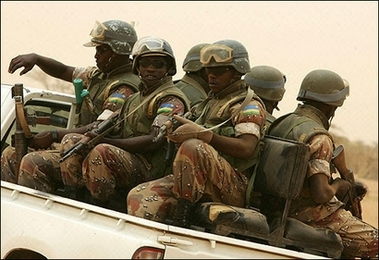UN OKs 26,000 peacekeepers for Darfur
(AP)
Updated: 2007-08-01 09:13
Updated: 2007-08-01 09:13
UNITED NATIONS - The UN Security Council approved a 26,000-strong peacekeeping force for Darfur on Tuesday to try to help end four years of fighting that has killed more than 200,000 people in the vast Sudanese region.
 Rwandan soldiers from the African Union Mission in Sudan patrol between Al-Fasher, the capital of Northern Darfur, and Kuma, in 2006. [Agencies]  |
UN Secretary-General Ban Ki-moon called it a "historic and unprecedented resolution" that will send "a clear and powerful signal" of the UN's commitment to help to the people of Darfur and the surrounding region "and close this tragic chapter in Sudan's history."
But Ban, who has made Darfur a top priority since taking over as UN chief on Jan. 1, stressed that "it is only through a political process that we can achieve a sustainable solution to the conflict."
Sudan's UN ambassador, Abdalmahmood Abdalhaleem Mohamad, told reporters the government would discuss the resolution, which "contained many positive elements, and also it went to considerable extent to satisfy our concerns."
He had reacted harshly to earlier versions of the resolution, calling one circulated last week "ugly" and "awful." Britain and France, the key sponsors of the resolution, stripped harsh language in several successive drafts in an attempt to win approval for the resolution.
Britain's UN Ambassador Emyr Jones Parry said the AU-UN force will be the largest peacekeeping force in the world and called it "an unprecedented undertaking in scale, complexity and importance."
"But we will also look for the parties, all of them, to cooperate," he said. "We will judge them by their action, not by their words."
French Foreign Minister Bernard Kouchner called for "full mobilization of the international community" to ensure a "rapid deployment" of the force "in conditions that allow it to make a difference."
The conflict in Darfur began in February 2003, when ethnic African tribes rebelled against what they consider decades of neglect and discrimination by the Arab-dominated government. Sudan's government is accused of retaliating by unleashing a militia of Arab nomads known as the janjaweed - a charge it denies.
The poorly equipped and underfunded African Union force has been unable to stop the fighting, and neither has the Darfur Peace Agreement, signed a year ago by the government and one rebel group. Other rebel factions called the deal insufficient, and fighting has continued.
The UN and Western governments have pressed Sudan since November to accept a three-stage UN plan for a joint force.
After stalling for months, Sudanese President Omar al-Bashir agreed in April to a "heavy support package" to strengthen the AU force, including 3,000 UN troops, police and civilian personnel along with aircraft and other equipment. The resolution calls for its speedy deployment.
The resolution authorizes the much larger 26,000-strong hybrid force, which will be called UNAMID and have "a predominantly African character," as Sudan demanded.
The force will have up to 19,555 military personnel, including 360 military observers and liaison officers, a civilian component including up to 3,772 international police, and 19 special police units with up to 2,660 officers.
The resolution calls on UN member states to finalize their contributions to the hybrid force in 30 days, and the UN and the AU to agree on the final military composition during the same period.
The final draft has one section under Chapter 7 of the UN Charter, which deals with threats to peace and security and can be militarily enforced.
It authorizes UNAMID to take "the necessary action" to protect and ensure freedom of movement for its own personnel and humanitarian workers.
It also authorizes the hybrid force to take action to "support early and effective implementation of the Darfur Peace Agreement, and prevent the disruption of its implementation and armed attacks, and thus to protect civilians, without prejudice to the responsibility of the government of Sudan."
But the final resolution dropped Chapter 7 authorization to monitor the presence of arms in Darfur in violation of UN resolutions and the peace agreement, which Sudan strongly objected to.
There is "nothing enjoyable in these type of things but we will deliver our commitments," Mohamed, the Sudanese envoy, said when asked about Sudan's reaction to the mandate for the new force.
|
|
|
||
|
||
|
|
|
|